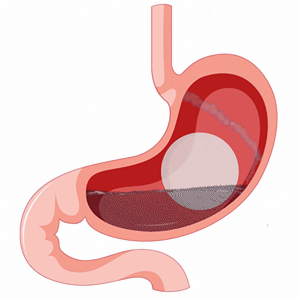Orbera Gastric Balloon Surgery Dallas, Fort Worth, Mansfield & Plano
- Home
- Non Surgical Medical Weight Loss
- Orbera Fluid Filled Gastric Balloon

Obesity is a serious, chronic disease that can adversely affect the body. People with obesity are usually at a greater risk of developing health conditions such as heart disease, Type 2 diabetes, and bone and joint disease. If you want to break through weight loss barriers without surgery, the Orbera (Fluid-Filled) Gastric balloon procedure can be a possible way out. One of the many advantages of the Orbera gastric balloon is that, compared to other forms of gastric surgeries, more people qualify for the procedure.
What is an Orbera Gastric Balloon?
Orbera Gastric balloon is a non-surgical outpatient procedure recommended for individuals who are unable to lose weight with diet and exercise alone and have body mass index between 30 to 40. During the gastric balloon procedure, a fluid filled balloon is inserted through your mouth, down your esophagus and into the stomach. The balloon takes up space, which limits food intake and makes you feel full sooner. It is a temporary procedure and the balloon is removed after a period of 6 months.
Candidates for Orbera Gastric Balloon
- Adults over 18 years
- Body Mass Index (BMI) is 30 – 40 kg/m2
- No prior Bariatric Surgery or Bowel/Stomach Problems
- Willing to participate in a medically supervised program
- Not comfortable with other forms of weight loss surgery
- Tried and failed at diet and exercise
- Ready to commit to a lifestyle change
- Ready to undergo balloon removal after six months
- Do not have a complicated medical history such as acid reflux, severe hernias, or stomach ulcers
Orbera Gastric Balloon Contradictions
Orbera gastric balloon is not a good option for:
- People who are unable to undergo endoscopy due to some medical reasons.
- Individuals who had undergone any gastrointestinal surgery.
- Individuals with an inflammatory disease of the gastrointestinal tract or other congenital anomalies.
- People with a large hiatal hernia or other structural abnormality in the esophagus or larynx.
- Women who are pregnant or planning to conceive within the next six months.
- Procedure
- Post-Op Care
- Risks & Complications
The placement of Orbera Gastric Balloon into the stomach is a simple, non-surgical outpatient procedure. First, a diagnostic test is done to make sure it is safe to perform the procedure. Then the deflated gastric balloon is inserted through the esophagus and into the stomach. Once it is in position, the balloon is inflated with saline and a dye, to maintain the required size. The procedure takes about 15 minutes to complete. The balloon is temporarily left in the stomach for about 6 months.
After the procedure, you may experience some cramps and nausea, as your stomach adjusts. Your throat may feel a little sore. You’ll follow a liquid or soft diet for a few weeks and followed by 6 months of a supervised diet plan. Our team will continue working closely with you during these 6 months.
As with any other procedure, Gastric balloon procedure involves certain risks and complications:
- Esophageal, gastric ulcers or perforation.
- Deflation of the balloon which can lead to blockage.
- Rupture of balloon dye (if used), which will be released in the urine.
Procedure
The placement of Orbera Gastric Balloon into the stomach is a simple, non-surgical outpatient procedure. First, a diagnostic test is done to make sure it is safe to perform the procedure. Then the deflated gastric balloon is inserted through the esophagus and into the stomach. Once it is in position, the balloon is inflated with saline and a dye, to maintain the required size.
Post-Op Care
After the procedure, you may experience some cramps and nausea, as your stomach adjusts. Your throat may feel a little sore. You’ll follow a liquid or soft diet for a few weeks and followed by 6 months of a supervised diet plan. Our team will continue working closely with you during these 6 months.
Risks & Complications
As with any other procedure, Gastric balloon procedure involves certain risks and complications:
- Esophageal, gastric ulcers or perforation.
- Deflation of the balloon which can lead to blockage.
- Rupture of balloon dye (if used), which will be released in the urine.




